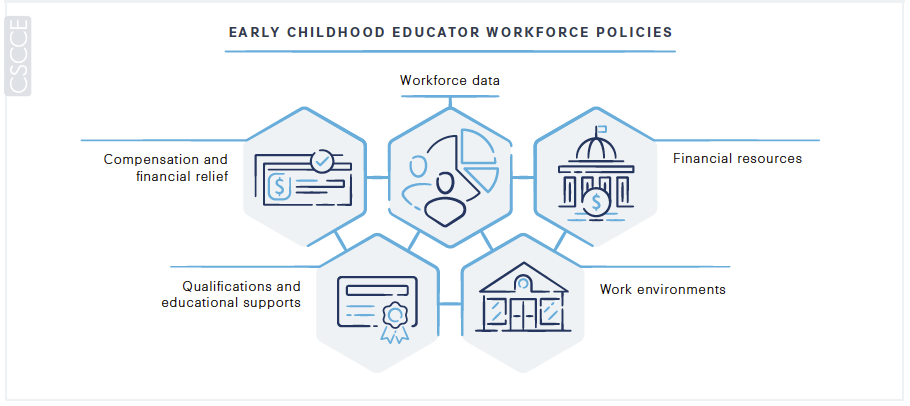Taking Action: Using the Early Childhood Workforce Index
Download Advocacy ToolkitPoor working conditions in early care and education (ECE) are not inevitable, but a product of policy choices. State decision makers can play a powerful role in reshaping early childhood jobs for the current and future ECE workforce. As an advocate who works with children or an advocate who understands the importance of this crucial and complex work, you can use the messages and findings from the Early Childhood Workforce Index to drive change and ensure that educators are front and center in the transformation.
There is no single ingredient to reform. The Index includes five essential elements of early care and education policy to support early educators:
Is your state making progress? Check your state’s 2020 Early Childhood Workforce Index profile or view the State Explorer.
For each of the five interconnected elements, our policy opportunities present a pathway to making headway for the early childhood workforce.


Qualifications & Educational Supports
Adequate preparation and access to foundational knowledge is necessary for teachers and administrators to develop the skills to provide high-quality learning experiences for children.
Framing the Issue
- Teacher-Advocates: “As early educators, we shape children’s lifelong learning. It’s complex work, and it requires that we continually advance our own knowledge and skills to improve our practice with children.”
- Policy Advocates: “In our state, the qualifications a child’s teacher is expected to meet depends more on what the family can afford and the types of programs available in their area, than on the child’s developmental and educational needs.”
- Responding to the COVID-19 pandemic: “The pandemic has forced early educators to quickly adapt to new teaching environments, whether remote or in the classroom. Educators have stepped up for children and families; it’s time for our state to step up for educators.”
Policy Opportunities for Change
- Align qualification requirements across settings with national recommendations (i.e., the Institute of Medicine and National Research Council report Transforming the Workforce for Children Birth Through Age 8: A Unifying Foundation).
- Establish minimum requirements that reflect foundational knowledge (i.e., a Child Development Associate Credential or equivalent) for all early childhood teaching staff.
- Require a bachelor’s degree with ECE specialization and individual licensure or certification for lead teachers and program leaders, in line with what is required for teachers of older children.
- Develop strategies and ensure sufficient financial resources to disrupt systemic barriers to education and to create the conditions for success in higher education. Ensure that all members of the current and future workforce have opportunities and supports to acquire education and training at no personal financial cost. These supports should begin with entry-level foundational knowledge and align with a pathway based on degree and competency requirements to facilitate attainment of associate and bachelor’s degrees. Include targeted opportunities and supports for members of historical minority racial and ethnic groups as well as individuals who speak English as a second language.
- Collect data about scholarship programs and other educational initiatives to identify disparities in access and to assess whether such programs are providing appropriate levels of support.
- As new qualification requirements are implemented, develop an intentional strategy to support the existing workforce to avoid displacing current early educators from their jobs. Provide options for members of the current workforce to maintain their employment by accounting for existing experience and by providing financial support to acquire additional education, training, or certification. Ensure adequate timelines to meet new requirements.
- Until qualifications are established in regulatory requirements, educators allocated time and resources to meet those requirements, and programs funded to pay educators accordingly, neither individuals nor programs should be penalized for failing to meet qualifications that are only recommended and not required.

Work Environment Standards
Workplace supports, such as paid planning time and paid time for professional development, are needed to ensure ongoing reflection, development, and educator well-being.
Framing the Issue
- Teacher-Advocates: “As an early educator, I am doing most of my planning unpaid at night and on weekends. It takes a toll on my well-being and is never enough time to prepare adequately.”
- Policy Advocates: “Teachers in the K-12 system can typically expect their jobs to include policies and resources that support teacher development and well-being. Unlike their K-12 counterparts, most early educators in our state are not able to rely on dependable breaks, substitutes, or paid time without child responsibilities in order to plan and confer with other teachers.”
- Responding to the COVID-19 pandemic: “Many early care and education programs in our state were barely breaking even before the pandemic. Programs need immediate increases in public funding to meet the new costs of cleaning and protective equipment, crucial to ensuring the health and safety of educators and children.”
Policy Opportunities for Change
- Adopt workplace standards, such as guidance on appropriate levels of paid planning time, which are necessary for educators to engage in professional practice to support children’s learning and to alleviate conditions that cause educator stress.
- Use existing models, such as the International Labor Organization Policy Guidelines and the U.S.-based Model Work Standards for Centers and Homes.
- Develop intentional mechanisms to engage educators as influential partners in the process of developing workplace standards to ensure these standards reflect their needs and experiences.
- In partnership with educators, assess and update definitions of quality, licensing, and competencies to include adopted workplace standards, with the goal of implementing equitable standards across programs. Recognize and remedy the racial and class inequities embedded in quality rating systems by providing sufficient public funding for all programs to meet standards.
- Provide financial resources and technical assistance to enable programs to implement standards in a reasonable period of time and to sustain compliance with these standards over time.
- Require all programs that receive public funding to complete training on the standards and to complete an annual self-assessment and improvement plan.
- Identify and implement strategies for ECE teachers, faculty, quality improvement staff and other stakeholders to learn about work environment issues, including via technical assistance, professional development, and teacher and leader preparation programs.
- Establish the right of all ECE staff to organize/join a union. Unions can serve as a way for the people doing the work to monitor working conditions and can provide a safe channel to report unsafe or problem conditions.
- Ensure protections are in place for workers who report workplace or regulatory violations (e.g., California’s whistleblowing law) and that all educators are aware of and informed about their rights, including state laws around occupational health and safety.
- Regularly collect data from early educators to assess how they experience work environment standards.
- In addition, as long as educators continue to work in emergency conditions in which they are risking their lives, states should immediately provide:
- PPE and sanitizing supplies that educators need for themselves and for the children in their care;
- Free access to COVID-19 testing and priority access to vaccines;
- Guaranteed paid sick leave if educators must quarantine because of a positive test or exposure to the virus or if they become symptomatic;
- Guaranteed health coverage for educators and family members in their household; and
- Guaranteed pay of no less than the locally assessed living wage.

Compensation & Financial Relief Strategies
Achieving sustained improvements in the quality of early childhood education services depends on upgrading the rewards associated with employment. Appropriate compensation and economic security are indispensable for attracting and retaining skilled educators.
Framing the Issue
- Teacher-Advocates: “I have the same level of education as a 2nd-grade teacher. Why should I be paid any less?”
- Policy Advocates: “Poor compensation of the workforce in our state undermines our efforts to improve quality and to attract and retain a skilled and stable workforce. While some progress has been made with supplements to wages, we have not yet been able to fundamentally shift the low earnings of the teachers of our youngest children, leaving many unable to support themselves and their families.”
- Responding to the COVID-19 pandemic: “Some states, like North Carolina, have been funding monthly bonus payments for early educators risking their lives during the pandemic. Higher wages are crucial to recruiting and retaining educators both during the pandemic and beyond.”
Policy Opportunities for Change
- Prioritize appropriate compensation — wages/salaries as well as benefits (e.g., health insurance, retirement plans) — as an essential component for rebuilding the early care and education system. Include early educators working in both center- and home-based child care settings. Educate policymakers and the public at large about the importance of better pay and benefits for ensuring a skilled and stable early educator workforce.
- Establish wage and benefit standards that: set the wage floor at the locally assessed living wage; account for job role, experience, and education levels; and calibrate up to parity with similarly qualified elementary school teachers. Ensure regular adjustments for cost of living and changes in educational attainment.
- Dedicate sufficient public funding for all programs to meet wage and benefit standards. Require and monitor adherence to those standards as a condition of the funding.
- Collect data on early educator compensation in order to identify and remedy racial wage gaps and other pay inequities, such as lower pay for infant-toddler teachers.
- Frame advocacy messages to clarify that financial relief initiatives (tax credits, stipends) are an interim strategy, not a long-term solution to achieve appropriate wages and benefits.

Workforce Data
Designing and implementing professional development and strengthening workforce supports requires up-to-date and comprehensive information.
Framing the Issue
- Teacher-Advocates: “It’s important for parents and the public to know what our working conditions are like, and the detrimental effects on our own well-being and the children in our care.”
- Policy Advocates: “Improving the status of our early educator workforce rests on our ability to describe basic demographic, education, and employment characteristics. Currently, we collect only limited data on the workforce and only for those in certain settings or funded programs. This makes it challenging to answer questions like ‘how prepared is the current workforce to provide effective care and education to all our state’s children’ or to understand the reach and effectiveness of current policies.”
- Responding to the COVID-19 pandemic: “How can we ensure that essential workers like early educators have access to critical health and safety provisions like health insurance and paid sick leave if we’re not collecting sufficient information on our ECE workforce?”
Policy Opportunities for Change
- Develop and commit to a plan to enact required participation in state workforce data systems by all members of the ECE workforce, whether employed in schools or licensed center- and home-based child care settings.
- Ensure that data systems support analysis and reporting and are used to:
- Assess the impact of policy and funding decisions on early educators;
- Inform local, state, and national ECE reform efforts; and
- Identify and remedy disparities in such areas as compensation, educational attainment, and tenure according to, for example, race, age, and geography.
- Identify potential federal (e.g., Child Care Development Fund [CCDF]), state, and local funding sources and design advocacy strategies to secure funds for workforce data collection, management, and analysis.
- Ensure that workforce data collection and analysis are part of early childhood governance structures and support the integration of workforce data systems with broader early childhood data, such as licensing databases, resource and referral databases, quality rating and improvement systems, early childhood health data, and K-12 data. Prioritize workforce data system development and improvement in state CCDF plans.
- Join with other state leaders to encourage federal leaders to:
- Establish common fields to be used across datasets to ensure comparability;
- Resolve long-standing inadequacies in all federally funded datasets that include data on early educators; and
- Dedicate sustained funding for workforce data collection.

Financial Resources
Appropriate preparation, on-the-job support, and compensation for the ECE workforce requires mobilizing additional and more sustainable public funding.
Framing the Issue
- Teacher-Advocates: “For too long, we have been asked to bear the substantial responsibilities of educating this nation’s youngest children with far too little funding. We can’t ask parents to pay any more; we must have sufficient public funding to cover our costs.”
- Policy Advocates: “Multiple funding streams can make it challenging to consider financial strategies to improve conditions across ECE settings. Yet, if we want to ensure that every child in our state has the opportunity to thrive, it is critical that we strategize on how to finance access to affordable high-quality early care and education.”
- Responding to the COVID-19 pandemic: “Early care and education is essential work; why haven’t early educators been prioritized in state budgets?”
Policy Opportunities for Change
- Identify the public funding needed at the state level to ensure ECE access for all children and families as well as good jobs for educators.
- Estimate the true cost of services that relieves the financial burden on families, while also advancing preparation, workplace supports, and compensation of the workforce. The values-based budget estimates developed by CSCCE and the Economic Policy Institute are a good starting point to understand likely costs at the state level.
- Determine the extent of the cost gap between existing resources and what is required to accomplish reforms.
- Create a plan for phased implementation. For example, an eight-year plan could include Phase 1: development; Phase 2: progression and learnings; and Phase 3: full implementation. Identify costs associated with each phase and incorporate data collection and analysis to facilitate learning and adjustments during the implementation process.
- Commit to securing dedicated, sustainable funds to realize reforms.
- Develop an educational campaign to assist policymakers and the public in understanding the costs of building an equitable system and the benefits of this investment.
- Support national proposals, such as a ”New Deal” child care infrastructure investment, to increase the number and safety of community-based facilities. Funding for small center- and home-based programs to make needed repairs and improve ventilation is crucial to ensure a safe learning environment for children and a safe work environment for educators during the COVID-19 pandemic.
- Prioritize ECE in state budgets in addition to or in the absence of increased federal funding.
“Our state team used the policy recommendations in the Early Childhood Workforce Index to review and resolve policy issues. The strategies for true compensation reform provided a helpful framework as we set our goals for transforming early educator compensation.”
Child Care Aware of Minnesota